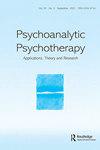Group dynamic interpersonal therapy (GDIT): adapting an individual interpersonal therapy to a group setting in an NHS IAPT service: a pilot study
IF 1.2
Q1 PSYCHOLOGY, PSYCHOANALYSIS
引用次数: 1
Abstract
Dynamic interpersonal therapy (DIT) was developed for individual clients. This pilot project set out to evaluate if DIT could be adapted to group psychotherapy. Three consecutive groups were run in an NHS IAPT service over two years. Twenty-seven clients (10 men and 17 women, median age 34) were offered treatment. Groups were facilitated by accredited DIT therapists. Clients completed the PHQ9 and the GAD7 at assessment and then weekly. Scores were used to evaluate the impact of GDIT on client symptoms. Data collected during routine treatment was later analysed. The delivery of key aspects of the model that included the formulation of the IPAF and the Goodbye Letter were changed. Results suggest that DIT can be adapted to a group setting and that this way of working may have significant benefits for clients. 74% of patients (n = 19) who completed treatment were above Caseness on the PHQ9 (p = < .00001, d = 1.82) and 58% on the GAD7 (p = < .000001, d = 1.63). Only one client (5%) dropped out of treatment. Given the small size of the sample and no control, the reduction in client symptoms cannot be reliably attributed to GDIT. More research is needed.群体动态人际治疗(GDIT):在NHS IAPT服务中适应个体人际治疗的群体设置:一项试点研究
动态人际治疗(DIT)是针对个人客户开发的。这个试点项目旨在评估DIT是否可以适用于团体心理治疗。连续三组在NHS IAPT服务中运行超过两年。27名患者(10名男性,17名女性,中位年龄34岁)接受治疗。小组由认可的DIT治疗师协助。患者在评估时完成PHQ9和GAD7,然后每周完成。评分用于评估GDIT对患者症状的影响。随后对常规治疗期间收集的数据进行分析。该模式的关键方面,包括IPAF的制定和告别信的交付都发生了变化。结果表明,DIT可以适应于群体环境,这种工作方式可能对客户有显著的好处。完成治疗的患者中,74% (n = 19)的PHQ9评分高于Caseness (p = < 0.00001, d = 1.82), 58%的GAD7评分高于Caseness (p = < 0.000001, d = 1.63)。只有一名患者(5%)退出治疗。由于样本量小且无对照,病人症状的减轻不能可靠地归因于GDIT。需要更多的研究。
本文章由计算机程序翻译,如有差异,请以英文原文为准。
求助全文
约1分钟内获得全文
求助全文
来源期刊

Psychoanalytic Psychotherapy
PSYCHOLOGY, PSYCHOANALYSIS-
CiteScore
1.30
自引率
37.50%
发文量
22
期刊介绍:
Psychoanalytic Psychotherapy publishes original contributions on the application, development and evaluation of psychoanalytic ideas and therapeutic interventions in the public health sector and other related applied settings. The Journal aims to promote theoretical and applied developments that are underpinned by a psychoanalytic understanding of the mind. Its aims are consonant with those of the Association for Psychoanalytic Psychotherapy in the NHS (APP in the NHS) in promoting applied psychoanalytic work and thinking in the health care system, across the whole age range.
 求助内容:
求助内容: 应助结果提醒方式:
应助结果提醒方式:


